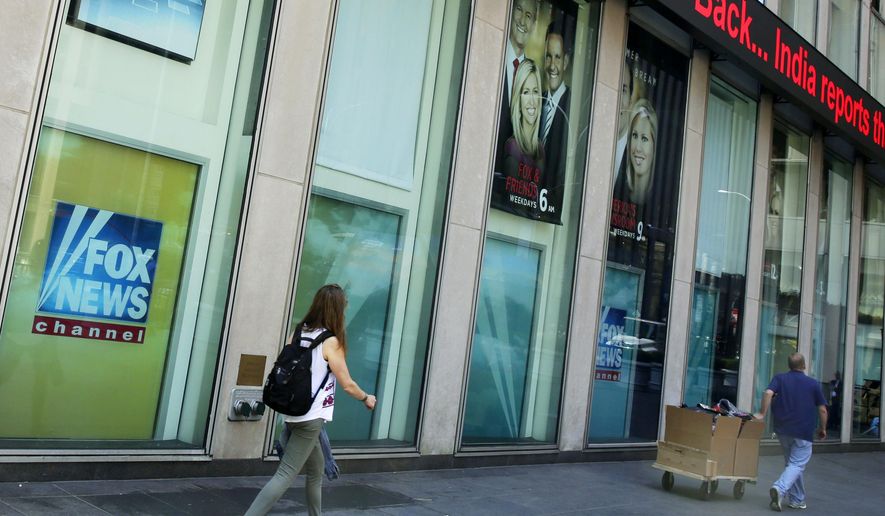Climate change, gun violence and Uncle Sam’s growing debt — they’re among the biggest topics in politics, yet Americans don’t have a good grasp on what the actual numbers say.
Those who favor CNN or MSNBC know even less than those who prefer Fox News or who don’t watch cable television at all, according to polling by the Heartland Institute, a conservative think tank.
Relatively few people could place the federal government’s total debt at $20 trillion to $30 trillion, but Fox viewers were about twice as likely as CNN viewers to do so, Heartland found in the polling, which Rasmussen Reports conducted.
On taxes, 36% of Fox viewers knew the top marginal tax rate was 30% to 40%. Just 23% of CNN watchers and 22% of MSNBC viewers knew that.
Most striking was climate change. More than half of CNN viewers and 58% of MSNBC viewers said at the rate the globe is warming, humanity is on pace for extinction within 100 years.
Heartland said that is decidedly not the scientific consensus. Just a quarter of Fox viewers believed doom is looming.
“If you watch [CNN and MSNBC], you’re maybe twice as likely to hold that view than people who are getting their news from other outlets,” said Justin Haskins, the editorial director for Heartland. “That means there are people answering that question who believe they will live through the climate apocalypse.”
Plenty of work has been conducted on Americans’ struggle with political knowledge, but Heartland wanted to know whether it mattered where they turned for news.
On issue after issue, those who favored networks with more liberal programming differed markedly from those who watched more conservative-leaning outlets.
CNN and MSNBC viewers vastly overstated the number of unarmed Black people killed by police each year. But Fox viewers were more likely to overstate the number of unarmed White people.
Across the board, cable news viewers were wrong about the percentage of Americans who lack health coverage. It was less than 10% in 2019, but just 7% of CNN viewers, 6% of MSNBC followers and 18% of Fox aficionados knew that.
Those who said they don’t watch cable news fell in between Fox and the liberal-leaning networks, as they did on most other questions.
The Heartland Institute’s poll surveyed 2,000 likely voters. It was conducted from April 29 through May 3.
The public’s lack of grasp of critical facts in political debates is nothing new.
The Pew Research Center sought a decade ago to measure Americans’ knowledge of the significant issues of the day.
Most people knew that the deficit was growing and that the U.S. was a net importer on the international trade scene. But Pew found Americans struggled when asked whether the federal government spent more on education, Medicare, defense or interest on the debt. Just 39% named defense — the correct answer.
People also struggled to name leading political figures, and barely anyone knew the rate of inflation.
The Fairleigh Dickinson University Poll has tested similar questions, broken out by what news sources they consume.
FDU’s approach was to count the total number of correct answers for aficionados of each news source on a battery of questions such as leadership in the Middle East, the winner of the Republican presidential caucuses in Iowa that year, and the unemployment rate.
Ignorance abounded, with no news source’s followers answering even half of the questions correctly. But FDU said Fox viewers ranked the worst, and those who follow talk radio, watched Sunday political talk shows or Comedy Central’s “The Daily Show” or listened to NPR did the best.
Academics for decades have debated Americans’ political knowledge and how much it matters to good governance.
Michael McKenna, a pollster and a top legislative aide in the Trump White House, said it does matter — somewhat.
“Not a million facts, not a thousand facts, but a handful,” said Mr. McKenna, who writes an opinion column for The Washington Times. “What facts people choose to use and avoid are always relevant to policy discussions.
“Most of the people in politics are engaged in fact. They are interested in what do the facts tell me, how do I get to where I’m trying to go. Everybody from county commissioners to senators,” he said. “But the loudest voices tend to be the dumbest voices, on both sides, and that means most of the people who are concerned with facts tend to get drowned out.”
The Heartland Institute’s Mr. Haskins said it’s the nature of television news to tell narratives rather than give facts, and that can lead viewers astray.
He pointed to the nearly 25% of CNN viewers who said at least 500 unarmed Black people are killed by police each year.
“Why do they believe that? Is it because CNN tells them it’s 500 a year? No. It’s because CNN doesn’t tell them how many are being shot by police, but they’re coming to that conclusion because [of] the narrative CNN provides to its viewers,” he said.
The numbers matter.
“If you believe there are 500 unarmed African Americans being killed every year, 5,000 a decade, you believe this is a crisis,” Mr. Haskins said. “But if the number is only 18, and you know it’s only 18, you might not view it the same way. So the narrative has less impact, or more impact, when you know the facts.”




Please read our comment policy before commenting.